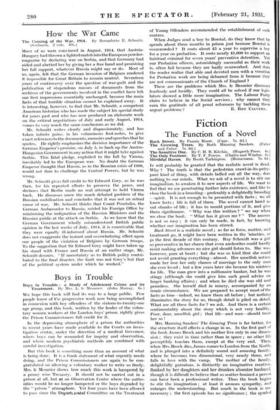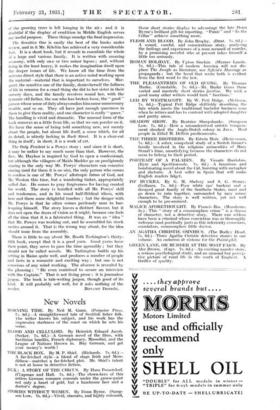Fiction
The Function of a Novel
Back Street. By Fannie Hurst. (Cape. 7s. 6d.) IT will probably be granted that the realistic novel is dead. Why ? The truth is that the pedestrian crawl-in-its-petty- pace kind of thing, with details ladled out all the way, doe, nothing.to our minds. What we ask of a novel is to stir our imagination, to awaken it to new aspects of life. We want to feel that we arc penetrating further into existence, and like to close the book in a brooding—preferably a delightedly brooding —spirit. It is not enough to be presented with facts ; we all know facts ; life is full of them. The novel cannot hand us out chunks of life ; it has to mould portions of it, and give them significance. ".Why was this written ? " we say when we close the book. " What has it given me ? " The answer is not so easy ; it can only be made, in fact, by knowing whether our imagination has been stirred.
Back Street is a realistic novel ; as far as form, matter, and treatment go, it might have been written in the 'nineties, or in the first decade of this century. Ray Schmidt was a girl so provocative in her charm that even anchorites could hardly resist making advances no nice girl should listen to. She was, however, pure at heart ; but she was so kind that she could not avoid granting everything—almost. Her unselfish nature made her lose her only chance of marriage to the only man she ever loved ; but a few years later she became his mistress for life. The man grew into a millionaire banker, but he was stingy (although she could give him such good advice on larger banking affairs) ; and when he died she was old and penniless. She herself died in misery, accompanied by an ironic circumstance. We are prepared to accept most of the facts as true—indeed, we knew them all before ; but nothing illuminates the story for us, though detail is piled on detail. What are all these facts for ? we ask. And there is a certain sentimentality about the story which is not very healthy. Poor, dear, unselfish girl ; that life—and men—should treat her so !
Mrs. Manning Sanders' The Growing Trees is far better, for the structure itself effects a change in us. In the first part of the book James Brock and his mother live only in one dimen- sion ; they exist in time rather than in space ; no other life perceptibly touches them, except at the very end. Then, when Mrs. Brock dies, James comes to London from the North, and is plunged into a definitely sound and amusing family. where he becomes two dimensional, very nearly three, and falls in love with the vamp. The mother of the family. delightfully garrulous, is distinctly an imaginative creation, flanked by her daughters and her drunken absentee husband, though it is difficult to believe that so scatter-brained a person can have been a professional writer. Thus the book begins to stir the imagination ; at least it arouses sympathy, and enlarges the understanding. But much in the book is un- necessary.; the first episode has no significance ; the symbol
of the growing trees is left hanging in the air ; and it is doubtful if the display of erudition in Middle English serves any useful purpose. These things smudge the final impression.
The Sensitive One is easily the best of the books under review, and in it Mr. Kitchin has achieved a very considerable feat. It is a short book, but it reveals in essentials the whole of a large and various family. It is written with amazing economy, with only one or two minor lapses ; and, without being in the least heavy, it makes the imagination dwell upon the deeper issues of life. We know all the time from the nervous direct style that there is an active mind working upon the material—material that is important to ourselves. Mar- garet, the sensitive one of the family, denies herself the fullness of life in remorse for a cruel thing she did to her sister in their nursery days, and the family revolves round her, with the tyrannic old father, the son who has broken loose, the " good " parson whose sense of duty always makes him cause unnecessary trouble, and so on. They all have just enough queerness in them to give them reality, and one character is really " queer." The handling is vivid and dramatic. The unusual form of the book removes us a little from life, so that we can ponder on it. We have the sense of being told something new, not merely about the people, but about life itself, a sense which, for all its detail, is utterly lacking in Back Street. It is a clear-cut thing in itself ; in short, it is a work of art.
The Only Penitent is a Powys story ; and since it is short, it may be unfair to say much more than that. However, the Rev. Mr. Hayhoe is inspired by God to open a confessional, but although the villagers of Maids Madder go on prodigiously sinning in the only way Mr. Powys' characters can conceive sinning (and for them it is no sin), the only person who comes to confess is one of Mr. Powys' alloticipie forms of God, not Mr. Weston this time, but a wandering tinker, appropriately called Jar. He comes to pray forgiveness for having created the world. The story is handled with all Mr. Powys' skill and tenderness, and in his usual half-Biblical idiom, with here and there some delightful touches ; but the danger with Mr. Powys is that he often comes perilously near to bur- lesquing himself. The story leaves a distinct flavour, but it does not open the doors of vision as it might, because one feels all the time that it is a fabricated thing. It was an " idea " that Mr. Powys was working out, and he assembled his stock rustics around it. That is the wrong way about, for the idea should issue from the assembly.
There is little to say about Mr. Booth Tarkington's thirty- fifth book, except that it is a good yarn. Good yarns haire their point, they serve to pass the time agreeably ; but they should not be called novels. Mr. Tarkington builds up his setting in Maine quite well, and produces a number of people and facts in a romantic and exciting way ; but one is not conscious of any mind working. The absence is revealed by the phrasing : " He even contrived to secure an interview with the Captain." That is not living prose ; it is journalese jargon. The book is tale-writing jargon, though good of its kind. It will probably sell well, for it asks nothing of the












































 Previous page
Previous page